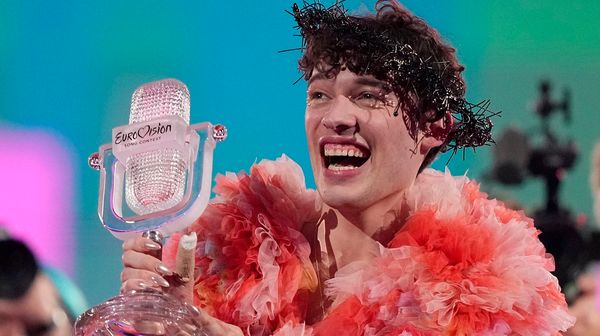May 12, 2010
Gay Actors, Allies Rip Newsweek Claim They Can't Portray Straights
Kilian Melloy READ TIME: 7 MIN.
An April 26 Newsweek article on gay actors playing straight roles--or rather, in the view of the article's author, Ramin Setoodeh, not playing those roles well--continues to raise hackles among the members of the stage and screen community.
Setoodeh's article took as an example Sean Hayes' turn on stage in a revival of the play Promises, Promises. Hayes, who recently came out as gay, played the role of the title character in writer-director Tommy O'Haver's 1998 movie Billy's Hollywood Screen Kiss; Hayes is more widely known for his role on the long-running series Will & Grace (1998-2006), in which he played Jack McFarland, a gay friend to the title characters, one of whom was a gay man named Will Truman, played by Eric McCormack.
"Hayes is among Hollywood's best verbal slapstickers, but his sexual orientation is part of who he is, and also part of his charm," wrote Setoodeh. "But frankly, it's weird seeing Hayes play straight. He comes off as wooden and insincere, like he's trying to hide something, which of course he is."
Added Setoodeh, "Even the play's most hilarious scene, when Chuck tries to pick up a drunk woman at a bar, devolves into unintentional camp. Is it funny because of all the '60s-era one-liners, or because the woman is so drunk (and clueless) that she agrees to go home with a guy we all know is gay?"
The article also cited Jonathan Groff, another openly gay actor, who stars in the comedy series Glee.
Among the tsunami of commentary the article generated at the Newsweek site was a missive from Hayes' Promises, Promises co-star, Kristin Chenoweth, who plays Chuck's love interest. Chenoweth wrote in to say, "Give me a break! We're actors first, whether we're playing prostitutes, baseball players, or the Lion King.
"Audiences come to theater to go on a journey," Chenoweth continued. "It's a character and it's called acting, and I'd put Hayes and his brilliance up there with some of the greatest actors period.
"Lastly, as someone who's been proudly advocating for equal rights and supporting GLBT causes for as long as I can remember, I know how much it means to young people struggling with their sexuality to see out & proud actors like Sean Hayes, Jonathan Groff, Neil Patrick Harris and Cynthia Nixon succeeding in their work without having to keep their sexuality a secret. No one needs to see a bigoted, factually inaccurate article that tells people who deviate from heterosexual norms that they can't be open about who they are and still achieve their dreams." Continued Chenoweth, "I am told on good authority that Mr. Setoodeh is a gay man himself and I would hope, as the author of this article, he would at least understand that. I encourage Newsweek to embrace stories which promote acceptance, love, unity and singing and dancing for all!"
Chenoweth's comments were followed by a reactions from two openly gay actors in the off-Broadway play The Temperamentals, reported Wayman Wong in a May 11 article at gay news and entertainment site AfterElton. The play concerns gay equality pioneers in the deeply anti-gay 1950s; at a recent talkback following a performance, an audience member asked what the cast thought of the Newsweek article.
"It was infuriating on so many levels," said star Cheyenne Jackson, who took exception to the article singling out Hayes and Groff. "It was very veiled self-loathing," added Jackson, going on to say, "Every time we go forward, some asshole like this takes us back a bit. I was really glad that Kristin Chenoweth wrote what she did."
Co-star Michael Urie cited his own role in The Temperamentals, where he plays designer Rudi Gernreich, an Austrian. "Look, I'm not from fucking Vienna," he pointed out. "We're all actors, and the audiences get it." Urie went on to say that Groff "made everyone want him in Spring Awakening. And Cheyenne was fucking Elvis in All Shook Up. He was sexy and hot. He's always playing straight. And people buy tickets to see him." Added Urie, "No straight critics accuse Sean Penn of not being able to play Harvey Milk or [criticize] Tom Hanks in Philadelphia."
In his original article, Setoodeh also pointed out that straight actors have played gay roles successfully--however, his thesis was that, for whatever reason, gay actors have a hard time portraying straight roles. Setoodeh suggested that the roles themselves might be problematic--of Groff's Glee character, Setoodeh wrote that the character "tried to bed his girlfriend while singing (and writhing to) Madonna's Like a Virgin. He is so distracting, I'm starting to wonder if Groff's character on the show is supposed to be secretly gay."
Setoodeh also addresses the need for the audience to suspend disbelief, and he cites Rock Hudson as a case in point: "For all the beefy bravado that Rock Hudson projects on-screen, Pillow Talk dissolves into a farce when you know the likes of his true bedmates." The writer takes George Clooney as another example: "If an actor of the stature of George Clooney came out of the closet tomorrow, would we still accept him as a heterosexual leading man? It's hard to say." Asks Setoodeh, "Doesn't it mean something that no openly gay actor like that exists?
But the article does seem to intimate that gay actors sometimes simply might not have the chops they need to pull off a convincing "straight" performance, a critique that cannot help but carry a sting when so many gays and lesbians have felt such enormous pressure to "pass" as heterosexual by acting certain ways in real life.
A Call for Boycott
The creator of Glee, Ryan Murphy, called for a boycott of Newsweek, according to an article posted by Detroit news station WENN on May 11. The story said that Setoodeh's article was "harsh" and that he "hammered" Hayes. The story said that Murphy had sent out a statement to news media saying that in his Newsweek piece, "Setoodeh basically says that out gay actors should go back into the closet and never attempt to play straight characters."
Murphy went on, "This article is as misguided as it is shocking and hurtful. It shocks me because Mr. Setoodeh is himself gay. But what is the most shocking of all is that Newsweek went ahead and published such a blatantly homophobic article in the first place...and has remained silent in the face of ongoing (and justified) criticism." Murphy demanded an apology and asked that Setoodeh travel to the Glee set in order to give an accounting of himself to Murphy and the show's cast.
Setoodeh responded to the criticism he had received by posting a second essay at Newsweek on May 10. Setoodeh got right to the point, referencing an unflattering review of Hayes' performance in Promises Promises that had been run in The New York Times, and then went on to say that the way the review was phrased--a "colorless" relationship with Chenoweth's character that seemed "more like that of a younger brother than a would-be lover"--constituted a "code: it's a way to say that Hayes's sexual orientation is getting in the way of his acting without saying the word gay.
"Instead of hiding behind double entendre and leaving the obvious unstated," Setoodeh continued, "I wrote an essay in the May 10 issue of NEWSWEEK called 'Straight Jacket' examining why, as a society, it's often hard for us to accept an openly gay actor playing a straight character." Added Setoodeh, "The point of my essay was not to disparage my own community, but to examine an issue that is being swept under the rug."
Once the story of Setoodeh's article and Chenoweth's response "went viral," threats and insults against the writer started, some referencing his sexuality (he was called a gay "Uncle Tom") and some his ethnicity ("I'm an American, born in Texas, of Iranian descent," Setoodeh clarified).
"I realize this is a complicated subject matter, but the Internet sometimes has a way of oversimplfying things," Setoodeh wrote. "My article became a straw man for homophobia and hurt in the world. If you were pro-gay, you were anti-NEWSWEEK."
One point that has almost been lost in the noise, confusion, and calls for boycott is the fact that Newsweek, like much traditional print media and despite its online presence, is not doing well and is up for sale, which begs the question of what good it would do to boycott a publication that is not well read, viral explosions due to controversial content aside. (One irony of the pushback is that many of those who criticized Setoodeh for the piece openly acknowledged not having read it themselves.)
Newsweek itself reported on the magazine's condition in a May 5 article that quoted Donald E. Graham, chairman of the magazine's parent company, Washington Post Co. "We have reported losses in the tens of millions for the last two years," Graham said. "Outstanding work by NEWSWEEK's people has significantly narrowed the losses in the last year and particularly in the last few months. But we do not see a path to continuing profitability under our management." Graham expressed hopefulness for the publication's future, but said, "Our aim will be--if we can do it--a rapid sale to a qualified buyer."
Newsweek commenced publication in 1933, the article said, and was acquired by the Washington Post Co. twenty-eight years later. The New York Times noted in a May 6 article that the magazine being put up for sale was part of a larger trend, citing the sale of TV Guide--another long-running publication--and the downsizing of Readers' Digest.
"The newsweeklies, for so long, have tried to be all things to all people," the Northwestern University school of journalism's Charles Whitaker told The New York Times, "and that's just not going to cut it in this highly niche, politically polarized, media-stratified environment that we live in today."
Kilian Melloy serves as EDGE Media Network's Associate Arts Editor and Staff Contributor. His professional memberships include the National Lesbian & Gay Journalists Association, the Boston Online Film Critics Association, The Gay and Lesbian Entertainment Critics Association, and the Boston Theater Critics Association's Elliot Norton Awards Committee.







